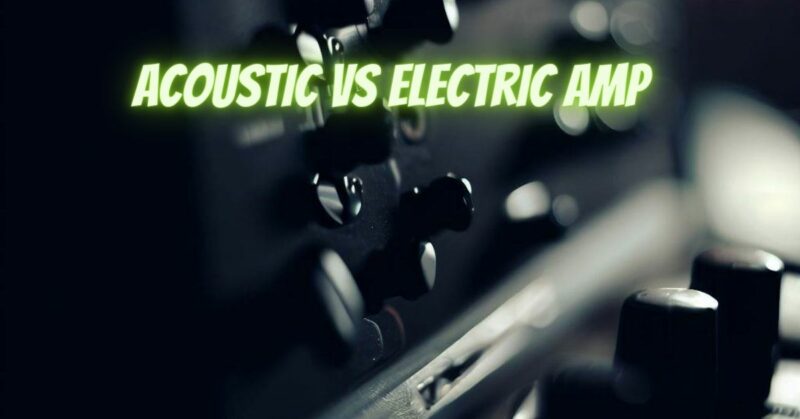The choice between an acoustic amp and an electric amp is a pivotal decision for guitarists, as it significantly impacts the sound and performance of your instrument. Acoustic and electric guitars have distinct tonal characteristics, and amplifiers tailored to each type ensure that those qualities are accurately reproduced. In this article, we’ll explore the differences between acoustic amps and electric amps, helping you make an informed choice based on your musical preferences and needs.
Acoustic Amps: Unveiling the Natural Acoustic Sound
1. Designed for Acoustic Instruments:
Acoustic amps are specifically crafted to amplify the natural sound of acoustic guitars and other acoustic instruments like violins, mandolins, and acoustic-electric guitars.
2. Transparency and Clarity:
Acoustic amps prioritize transparency and clarity, aiming to reproduce the nuances and tonal qualities of acoustic instruments accurately. They maintain the acoustic guitar’s resonance, harmonics, and intricate details.
3. Built-In EQ and Effects:
Many acoustic amps come with built-in EQ controls that allow you to shape the sound to match the characteristics of your acoustic guitar. They might also include effects like reverb and chorus tailored for acoustic instruments.
4. Feedback Control:
Acoustic amps often incorporate feedback control features to prevent unwanted noise and resonance, which can be an issue when amplifying acoustic instruments.
Electric Amps: Unleashing the Electric Guitar’s Signature Sound
1. Designed for Electric Guitars:
Electric amps are engineered to enhance and manipulate the distinctive characteristics of electric guitars, including their pickups and tonal shaping capabilities.
2. Distortion and Effects:
Electric amps are known for their ability to provide a wide range of distortion and effects, enabling guitarists to create various tones, from clean and crisp to heavily distorted.
3. Speaker Configuration:
Electric amps often feature speakers optimized to emphasize the frequencies produced by electric guitars, contributing to the iconic electric guitar sound.
Choosing the Right Amp: Factors to Consider
1. Instrument Type:
Select an amp that matches the type of guitar you’re using. Acoustic amps are tailored for acoustic instruments, while electric amps cater to electric guitars.
2. Tonality:
Consider whether you want to maintain the natural acoustic sound of your guitar (acoustic amp) or explore the versatility of effects and distortion (electric amp).
3. Performance Context:
Think about where you’ll be playing most often. Acoustic amps are ideal for intimate acoustic performances, while electric amps are suited for a variety of genres and venues.
4. Flexibility:
If you play both acoustic and electric guitars, you might opt for an amplifier with multiple channels or versatile EQ options to accommodate both types of instruments.
The choice between an acoustic amp and an electric amp boils down to your musical preferences, playing style, and the instruments you use. Acoustic amps excel at reproducing the natural sound of acoustic instruments with clarity and transparency, while electric amps allow you to explore a wide range of tones, effects, and distortion for your electric guitar. Understanding these differences will help you choose the right amplifier to enhance your playing experience and deliver the sound you envision for your music.


